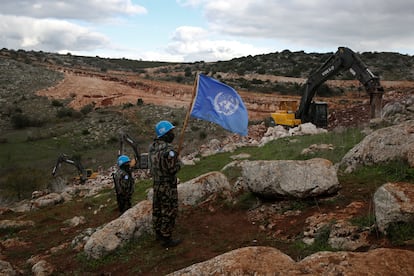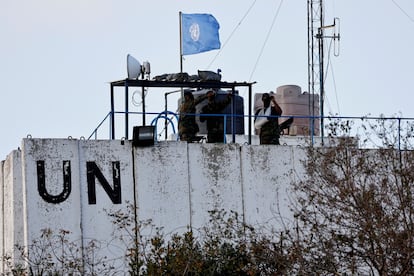Blue Helmets in southern Lebanon, caught between the gunfire and a vague mandate
Israel’s demand that the mission be relocated and its army’s attacks are jeopardizing the effectiveness of the UNIFIL operation, one of the oldest in the United Nations


To review United Nations peacekeeping missions with a list of successes and failures in hand would be equivalent to considering all the conflicts in the world over 75 years — to 2023 — as one. Because the conditions of these deployments have been as varied as the nature of the wars in which they have intervened or mediated: from the discreet effectiveness, despite a few surprises, of the missions in Kosovo or East Timor, to the inaction of the Dutch Blue Helmets while the Serbian forces perpetrated their genocide in Srebrenica; the paralysis of MINURSO in Western Sahara or the anachronism of the U.N. headquarters on the Green Line in Nicosia (Cyprus). Any example, however, pales in comparison to two current deployments, each more complex than the other: the controversial multinational security mission in Haiti, where it does not have official peacekeeping status, and, above all, the operation in southern Lebanon, the target in recent weeks of an Israeli offensive against Hezbollah.
Conflict resolution experts often argue that the main reason for mission failure is often broad mandates that are difficult to execute. This could be said of UNIFIL (the United Nations Interim Force in Lebanon), which has been active for more than 45 years — it was established in 1978, following Israel’s first invasion and subsequent withdrawal from southern Lebanon — but was updated in 2006, following Israel’s blitzkrieg against Hezbollah, through Security Council resolution 1701.
1701 is more than ever in question, due to the Israeli demand that its army participate in the “active implementation” of a hypothetical ceasefire and have freedom of action in Lebanese airspace, conditions that further compromise its implementation, but to what extent has this been fulfilled so far? Answering this question would be a way of assessing the effectiveness of the mission on the ground, but the answer depends largely on its definition: is UNIFIL a peacekeeping, intermediation, interposition or deterrence mission? Or all at once?
For Han Dorussen, professor of government at the University of Essex and editor of the collective volume Handbook of Peacekeeping and International Relations (2022), the South Lebanon mission has achieved “quite a lot” in its 45-year history, although its main objective, “to create the conditions that would allow Hezbollah and the Government of Israel to fulfil the terms of their agreement” of 2006, is now being called into question by the latter, due to a misunderstanding — or a complete amendment — about the type of mission. “UNIFIL is an observer mission,” Horussen concludes. “It was never able, either by its mandate or its resources, to demilitarize Hezbollah, as the Israeli government now claims it should have done, or to stop an Israeli incursion into Lebanon by force, as Hezbollah might have hoped. However, for considerable periods of time, it has constrained the behavior of both sides: Israel limited its incursions, although it did not stop them entirely, and Hezbollah’s military presence in southern Lebanon would probably have been stronger without the presence of the Blue Helmets. For the expert, it is revealing that, even after 7 October, “the military confrontation between the two remained limited… until a few weeks ago, obviously”, when Israel’s all-out offensive against Hezbollah began.
Mateja Peter, an associate professor at the University of St Andrews and co-author of United Nations Peace Operations in a Changing Global Order (2019), highlights the theoretical and practical limitations of the deployment. “UNIFIL is a traditional type of peacekeeping mission — the kind that was deployed during the Cold War — so its main tasks are to monitor violations and de-escalate situations that might arise. It is not a deterrence mission, so it cannot prevent parties from fighting, or a protection of civilians mission, like the mission in South Sudan. It cannot do things outside its mandate.”

The difficult equation, from which Hezbollah is theoretically excluded as it is not a national or a regular actor, but a party-militia, is none other than the six objectives of Resolution 1701, listed by e-mail by Vanessa Newby, a professor at the Faculty of Governance and Global Affairs at Leiden University: “Monitoring the cessation of hostilities; accompanying and supporting the Lebanese armed forces in their deployment in the south of the country, including the Blue Line; coordinating the activities of UNIFIL with both [Israeli and Lebanese] governments; facilitating humanitarian access to civilian populations, as well as the voluntary and safe return of displaced persons; supporting the Lebanese army in demilitarizing the area (without allowing weapons other than those of the army or UNIFIL), and helping Beirut, if requested, to secure its borders.” There is no mention of Hezbollah, although it is understood that references such as the demilitarization of the border are also directed at Iran’s faithful ally in Lebanon.
“If we evaluate UNIFIL on whether or not it has fully met its objectives, we cannot say that it has been entirely successful,” says Newby, coordinator of the Institute of Security and Global Affairs (ISGA). “The withdrawal of ‘all non-GoL and non-UNIFIL armed personnel, assets and weapons’ [the fifth clause, which implicitly refers to Hezbollah] has clearly not been achieved. However, that is not the only task of the mandate. In fact, the mission has executed many of the others, playing a key role,” adds Newby.
The Beirut power vacuum
Politically, the UN’s reliance on host country consent can limit its ability to operate effectively, particularly when local authorities are implicated (or even hijacked, as in the case of the Lebanese by Hezbollah, which was instrumental in forming governments in Beirut) in the conflict. Moreover, according to many experts, peacebuilding missions are often criticised for prioritising short-term stability over sustainable peace, which can lead to new episodes of violence after the withdrawal of international forces, something that is hypothetical in the case of those in southern Lebanon even if a ceasefire were achieved.
UNIFIL is also the only neutral observer on the ground, the eyes of the international community. “As an observer mission, it has also provided valuable information on the development of the situation on the ground, both to the international community and to the parties involved. The main reason why the Israeli government wants UNIFIL to move is probably so that it does not have to worry about the credible information it currently provides” on its offensive against Lebanon, Dorussen stresses.
Experts agree on strengthening the protection of civilians. While protecting civilians was already a problem for the first generation of peacekeepers, who were only deployed to monitor and physically separate parties that had already agreed to a ceasefire, in Lebanon their deployment takes place in an ongoing conflict with dissimilar actors. Asymmetric wars between armies and militias such as Hezbollah or armed gangs, if not private armies as in Haiti, almost always compromise the mission, as well as adding complexity and risk to their tasks, which is why they mention the contribution of UN forces to improving the living conditions of the civilian population.
According to Newby, they are responsible for “social projects, healthcare, and ‘quick-hit’ projects that improve local infrastructure, such as street lighting and computer training, language and municipal administration courses.” According to Horussen, “UNIFIL has provided valuable humanitarian aid and a sense of relative security to the local population in southern Lebanon.”
Mateja Peter elaborates on the establishment of basic, everyday conditions for the life of the civilian population: “UN staff do a lot of daily mediation and community engagement work in the areas they serve. Two successful projects were the provision of health services and the provision of municipal functions.”
Could the UN mission, which has been the target of Israeli attacks in recent weeks, become a third player in the war? “I don’t think we can say that UNIFIL has become, or is likely to become, a third player in the war. So far, the UN has resisted moving its peacekeeping troops [as Israel is asking] and seems to hope that international pressure will limit the actions of the IDF [Israel Defense Forces]. After all, the peacekeepers come from countries such as France, Spain and Italy which Israel does not want to alienate too much. But another possibility, and before UNIFIL becomes part of the war, is that the UN decides to relocate its troops,” says Dorussen.
The St Andrews professor recalls that UNIFIL is the mission with the largest European contribution to UN peacekeeping. “Italy, Spain, France, Poland, Serbia, Finland, Austria and Greece each contribute more than 100 soldiers. Therefore, the mission symbolically represents the European commitment to UN peacekeeping, and not just rhetorically, but with troops on the ground.” Good news, in the midst of the image and identity crisis of the United Nations missions “and of multilateralism in general.” “Their protection,” Peter adds, “is in the interest of Europe and, by extension, of the West.” Almost from the beginning of the Gaza war, Israel has targeted the UN, going so far as to declare its Secretary General, António Guterres, persona non grata, so that the role of UNIFIL could hardly escape animosity, even if the peace mission paradoxically ends up becoming a casus belli.
Sign up for our weekly newsletter to get more English-language news coverage from EL PAÍS USA Edition
Tu suscripción se está usando en otro dispositivo
¿Quieres añadir otro usuario a tu suscripción?
Si continúas leyendo en este dispositivo, no se podrá leer en el otro.
FlechaTu suscripción se está usando en otro dispositivo y solo puedes acceder a EL PAÍS desde un dispositivo a la vez.
Si quieres compartir tu cuenta, cambia tu suscripción a la modalidad Premium, así podrás añadir otro usuario. Cada uno accederá con su propia cuenta de email, lo que os permitirá personalizar vuestra experiencia en EL PAÍS.
¿Tienes una suscripción de empresa? Accede aquí para contratar más cuentas.
En el caso de no saber quién está usando tu cuenta, te recomendamos cambiar tu contraseña aquí.
Si decides continuar compartiendo tu cuenta, este mensaje se mostrará en tu dispositivo y en el de la otra persona que está usando tu cuenta de forma indefinida, afectando a tu experiencia de lectura. Puedes consultar aquí los términos y condiciones de la suscripción digital.








































